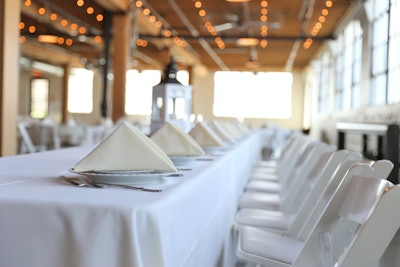
While questions on capacity, permitting, preferred vendors, and more will always be crucial when booking a venue, the COVID-19 pandemic has introduced some new concerns that need to be top-of-mind. Here’s what every planner should ask before signing that venue contract.
1. How flexible is your cancellation policy?
As governmental restrictions change daily during the pandemic, it’s crucial to know what will happen if your number of attendees changes or an event is no longer deemed safe. “If you need to reschedule or cancel, what do those terms look like? That’s going to be the baseline for any conversation that happens,” says Adam Sloyer, CEO and founder of New York-based Sequence Events.
Andrew Roby, owner of Andrew Roby Events in Washington, D.C., agrees, noting that standard venue contracts are likely not enough anymore. “We’re asking venues to alter their contracts to include clauses that allow us to change the date without penalty,” Roby says, adding that it’s crucial to find out what happens to deposits or payment plans if a date needs to change due to travel restrictions or a spike in COVID-19 cases. Will there be a change fee if the event date needs to move?
2. Is your venue financially stable right now?
Due to months of canceled events and the overall economic climate, it’s the unfortunate truth that “some venues, especially the independent ones, may have questionable financial stability right now,” points out Sloyer. “What happens if a venue goes out of business unexpectedly after you signed the contract and submitted a deposit?” Planners and clients need to know what kind of security will be offered if a venue can no longer hold the event for financial reasons.
3. How proactive are your sanitization procedures?
Sanitation is huge, and venues should be upfront about the thorough steps they are taking to keep attendees—and staff—safe. “If a venue is rolling out a comprehensive sanitation plan, that’s a really significant step in the right direction—as opposed to the planner having to ask what they’re doing,” says Sloyer. “Is the staff wearing masks, are they being monitored on a daily basis?” In addition to questions about common areas such as bathrooms, he adds, make sure to learn how often audiovisual equipment—such as microphones, headphones, or lecterns—is being sanitized, and what the process is to keep them clean as the event goes on.
Roby finds this question especially crucial when it comes to hotels. “These hotels are doing events, but at the same time are housing people—and all these people are traveling throughout the venue’s common areas,” he points out. When booking a hotel, ask about the guest room capacity to learn how many possible interactions your attendees may have.
4. What modifications are being made to registration and check-in?
Check-in is one area that’s ripe for lines and crowding—but it’s also an optimal place for options such as thermal scanning for fevers. Find out if the venue already has methods in place for screening attendees or staggering check-in, suggests Sloyer, or if that task will fall on the planner. This is also the space to ask if the venue has a built-in protocol for contact tracing, in case an attendee falls ill.
5. How are your preferred caterers keeping food and beverage sanitary?
If you’re not able to bring in your own catering team, learn how proactive the venue’s preferred caterers are being with their sanitation plans—and what statistics or data they used to create those plans. “Everyone is handling it a little bit differently,” notes Sloyer. “How are you handling passed hors d’oeuvres, for example? We’ve started to see some venues come out and say, ‘We’re not doing them at all,’ while others are explaining what they’re going to do. Catering is such a major part of the event, so the discussion needs to get really nuanced.”
6. What are your livestreaming capabilities to bring in a virtual audience?
The reality is that hybrid events—with a small, in-person audience and a larger virtual audience—are likely here to stay for quite some time, so it’s important to learn your options for streaming integration. Make sure the venue’s Wi-Fi and other audiovisual capabilities are enough for what you have planned, says Roby, especially in a venue such as a hotel. “It’s really important that we’re not given just the standard Wi-Fi service that all the guests have,” he says. “I also want to make sure that the venue has the capacity to increase the Wi-Fi capabilities as needed—because if I’m livestreaming, it will usually go on for at least an hour. The service needs to be strong enough to not be interrupted.”
7. What other modifications are you taking to address the pandemic?
Is the venue modifying outdoor space to move more events into open-air environments? Offering virtual site visits to cut down on in-person interactions during the planning stage? Finding creative or stylish ways to enforce social distancing? Using technology and mobile apps to offer contactless experiences? Above all else, look for a venue that is being thoughtful, proactive, and transparent about their plans to keep attendees and staff safe.
A version of this story appeared in the fall 2020 issue of BizBash.
A note from BizBash: As COVID-19 cases rise and cities impose new restrictions on gatherings, we encourage you to stay up-to-date on your local regulations to ensure a safe experience for your guests. Click here for ideas and inspiration for virtual events of all types.



















